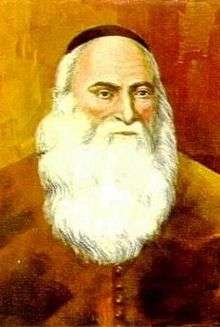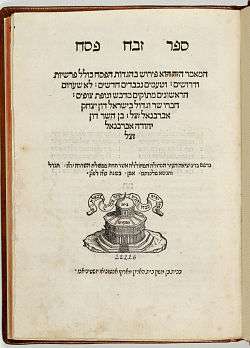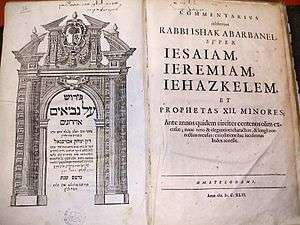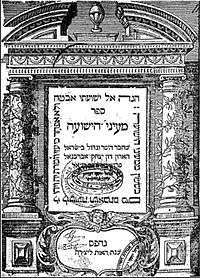Isaac Abravanel
| Don Isaac Abravanel | |
|---|---|
 | |
| Born |
Isaac ben Judah Abravanel 1437 Lisbon, Kingdom of Portugal |
| Died |
1508 (aged 70–71) Venice, Republic of Venice |
| Resting place | Padua |
| Religion | Judaism |
Isaac ben Judah Abravanel (1437–1508) אברבנאל, יצחק בן יהודה , commonly referred to just as Abravanel, also spelled Abarbanel or Abrabanel, was a Portuguese Jewish statesman, philosopher, Bible commentator, and financier.[1]
Biography
Abravanel was born in Lisbon, Portugal, into one of the oldest and most distinguished Jewish Iberian families, the Abravanel family, who had escaped massacre in Castile in 1391. A student of the rabbi of Lisbon, Joseph Chaim,[2] he became well versed in rabbinic literature and in the learning of his time, devoting his early years to the study of Jewish philosophy. Abravanel is quoted as saying that he included Joseph ibn Shem-Tov as his mentor. At twenty years old, he wrote on the original form of the natural elements, on religious questions and prophecy. Together with his intellectual abilities, he showed a complete mastery of financial matters. This attracted the attention of King Afonso V of Portugal who employed him as treasurer.
He used his high position and the great wealth he had inherited from his father, to aid his co-religionists. When his patron, Afonso captured the city of Arzila, in Morocco, the Jewish captives faced being sold as slaves. Abravanel contributed largely to the funds needed to free them, and personally arranged for collections throughout Portugal. He also wrote to his learned and wealthy friend,[3] Vitale (Yehiel) Nissim da Pisa, on behalf of the captives.
After the death of Afonso he was obliged to relinquish his office, having been accused by King John II of connivance with the Duke of Braganza, who had been executed on the charge of conspiracy. Abravanel, warned in time, saved himself by a hasty flight to Castile in 1483. His large fortune was confiscated by royal decree.
At Toledo, his new home, he occupied himself at first with Biblical studies, and in the course of six months produced an extensive commentary on the books of Joshua, Judges, and Samuel. But shortly afterward he entered the service of the house of Castile. Together with his friend, the influential Don Abraham Senior, of Segovia, he undertook to farm the revenues and to supply provisions for the royal army, contracts that he carried out to the entire satisfaction of Queen Isabella.
During the Moorish war, Abravanel advanced considerable sums of money to the king. When the Jews were ordered banished from Spain with the Alhambra decree, he did all in his power to induce the king to revoke the edict. He unsuccessfully offered the king 30,000 ducats ($68,400 nominal value). He left Spain with his fellow Jews and went to Naples where, soon after, he entered the service of the king. For a short time he lived in peace undisturbed; but when the city was taken by the French, bereft of all his possessions, he followed the young king, Alfonso, in 1495, to Messina; then went to Corfu; and in 1496 settled in Monopoli, and lastly in 1503 settled in Venice, where his services were employed in negotiating a commercial treaty between Portugal and the Venetian republic.
Several times during the mid-to-late 15th century, he personally spent large amounts of his personal fortunes to bribe the Spanish Monarchy to permit the Jews to remain in Spain. It is claimed that Abravanel offered them 600,000 crowns for the revocation of the edict. It is said also that Ferdinand hesitated, but was prevented from accepting the offer by Torquemada, the grand inquisitor, who dashed into the royal presence and, throwing a crucifix down before the king and queen, asked whether, like Judas, they would betray their Lord for money. In the end, he managed only to get the date for the expulsion to be extended by two days.
He died in Venice in 1508 and was buried in Padua next to Rabbi Judah Minz, Rabbi of Padua. Owing to the destruction of the Jewish cemetery there during the Siege of Padua in 1509, his grave is now unknown.[4]
Works
Abravanel wrote many works during his lifetime which are often categorized into three groups: exegesis, philosophy, and apologetics. His philosophy dealt with the sciences and how the general field relates to the Jewish religion and traditions, and his apologetics defends the Jewish idea of the coming of the Messiah. Abravanel’s exegetic writings were different from the usual biblical commentaries because he took social and political issues of the times into consideration.[5] He believed that mere commentary was not enough, but that the actual lives of the Jewish people must be deliberated on as well when discussing such an important topic as the Bible. He also took the time to include an introduction concerning the character of each book he commented on, as well as its date of composition, and the intention of the original author, in order to make the works more accessible to the average reader.
Christian scholars appreciated the convenience of Abravanel's commentaries, and often used them when preparing their own exegetical writing. This may have had something to do with Abravanel’s openness towards the Christian religion, since he worked closely with Messianic ideas found within Judaism. Because of this, Abravanel’s works were translated and distributed within the world of Christian scholarship.
Exegesis


Abravanel primarily composed commentaries on the books of the Major and Minor Prophets. His exegetical writings are set against a richly-conceived backdrop of the Jewish historical and sociocultural experience, and it is often implied that his exegesis was sculpted with the purpose of giving hope to the Jews of Spain that the arrival of the Messiah was imminent in their days. This idea distinguished him from many other philosophers of the age, who did not rely as heavily on Messianic concepts. Abravanel's major peshat works are
- Ma'yanei ha-Yeshu'ah (“The Wellsprings of Salvation" מעייני הישועה), which is a commentary on the Book of Daniel;
- Yeshu'ot Meshiho (“The Salvation of His Anointed" ישועות משיחו), an interpretation of rabbinic literature about the Messiah; and
- Mashmi'a Yeshu'ah (“Announcing Salvation" "משמיע ישועה" ), a commentary on the messianic prophecies in the prophetical books.
These three books are considered the separate parts of a larger work entitled “Migdal Yeshu'ot” (“Tower of Salvation” מגדל ישועות ).
His commentaries are divided into chapters, each of which is preceded by a list of questions or difficulties that he sets out to explain over the course of the chapter. Not only did this make it easier for scholars to find the answers they were looking for, but these lists of difficulties aided the average student in studying Abravanel's work. In his commentary on the Pentateuch these questions have no fixed number, sometimes amounting to over 40, but in his commentary to the Prophets he limits himself to six. Abravanel rarely forayed into the world of grammatical or philological investigation in the vein of Abraham ibn Ezra or David Kimhi before him, instead focusing on a content-based investigation of the Scripture at hand.
Occasionally Abravanel digresses from the subject under discussion, particularly in his commentary on the Pentateuch. His style and presentation is prolix and often repetitive. Some of his interpretations derive from homilies delivered in the synagogue. He vehemently fought the extreme rationalism of philosophical interpretation as well as interpretations based on philosophical allegory. At the same time he himself had recourse, especially in his commentary on the Pentateuch, to numerous interpretations based on philosophy.
His opposition to philosophical allegory must also be ascribed to the conditions of his time, the fear of undermining the unquestioning faith of the simple Jew, and the danger to Jewish survival in exile. This also explains Abravanel's faith in the Messianic concepts of Judaism, as well as his need to make his work accessible to all Jews instead of writing merely for the scholars of his time. Although his commentary often differed from kabbalistic interpretations, Abravanel nonetheless believed that the Torah had a hidden meaning in addition to its overt significance, and thus he interpreted passages in the Torah in various ways. His commentary to Deuteronomy 25:5 demonstrates both his knowledge and endorsement of kabbalists and kabbalistic understanding of Scripture. Side by side with philosophical concepts (entitled “the analytical way,” “the scientific,” or “the method of wisdom”) he gives “the way of the Torah,” i.e., the moral and religious tenets to be derived from the text.
He quoted extensively from the Midrash, but allowed himself to criticize his source when, in his view, it did not accord with the literal meaning of the text. He explains, “I shall not refrain from pointing to the weakness inherent in their statements where they are homiletical in nature and are not accepted by them as authoritative” (Introduction to Joshua).
Overall, Abravanel's exegetical writings are notable for the following three distinctions:
- His comparison of the social structure of society in biblical times with that of the European society in his day (for example, in dealing with the institution of monarchy, I Samuel 8). He had wide recourse to historical interpretation, particularly in his commentaries to the Major and Minor Prophets and to the Book of Daniel, but in numerous instances his interpretations are anachronistic (for example, Judges 18).
- Preoccupation with Christian exegesis and exegetes. He generally disputed their christological interpretations, especially those of Jerome. But he did not hesitate to borrow from them when their interpretation seemed correct to him. “Indeed I regard their words in this matter to be more acceptable than those of the rabbis to which I have referred” (I Kings 8, reply to the sixth question).
- His introductions to the books of the prophets, which are much more comprehensive than those of his predecessors. In them he deals with the content of the books, the division of the material, their authors and the time of their compilation, and also drew comparisons between the method and style of the various prophets. His investigations are made in the spirit of medieval scholasticism. He may consequently be considered as a pioneer of the modern science of Bible propædeutics.
However, the major characteristic that separated Abravanel from his predecessors was his unflagging commitment toward using the Scripture as a means of elucidating the status quo of his surrounding Jewish community; as a historical scholar, Abravanel was able to contemporize the lessons of the historical eras described in the Scripture and apply them successfully in his explanations of modern Jewish living. Abravanel, who had himself taken part in the politics of the great powers of the day, believed that mere consideration of the literary elements of Scripture was insufficient, and that the political and social life of the characters in the Tanakh must also be taken into account. Due to the overall excellence and exhaustiveness of Abravanel's exegetical literature, he was looked to as a beacon for later Christian scholarship, which often included the tasks of translating and condensing his works.
Philosophy
Abravanel's Jewish predecessors in the realm of philosophy did not receive the same tolerance at his hands as the Christians did. Men like Albalag, Palquera, Gersonides, Narboni, and others, were denounced by Abravanel as infidels and misleading guides for assuming a comparatively liberal standpoint in religio-philosophical questions. Abravanel was essentially an opponent of philosophy, despite his authority on the subject, because his entire understanding of the Jewish religion was based on God’s revelation in Jewish history. There is a common misconception that Abravanel agreed with Maimonidean views; while sometimes their ideas matched up, most of Abravanel’s thoughts strongly disagreed with those of Maimonides.
A characteristic instance of his vacillation is afforded by his most important religious work, the "Rosh Amanah" (The Pinnacle of Faith), based on Cant. iv. 8. This work, devoted to the championship of the Maimonidean thirteen articles of belief against the attacks of Crescas and Albo, ends with the statement that Maimonides compiled these articles merely in accordance with the fashion of other nations, which set up axioms or fundamental principles for their science. However, he holds that Judaism has nothing in common with human science; that the teachings of the Torah are revelations from God, and therefore are all of equal value; that among them are neither principles nor corollaries from principles.
Abravanel agrees and supports some of Maimonides ideas; however he assails Maimonides' conception that the prophetic visions were the creations of imagination. Abravanel will not hear of this explanation, even for the bat kol of the Talmud, which, according to him, was a veritable voice made audible by God — a miracle, in fact (commentary on Gen. xvi.).
In like manner Abravanel exceeded all his predecessors in combating Maimonides' theory of the "Heavenly Chariot" in Ezekiel, and commentary on the Guide for the Perplexed, part III:71-74.
Apologetics

Abravanel felt deeply the hopelessness and despair which possessed Spanish Jews in the years following their expulsion from Spain, and set himself, therefore, to champion and strengthen their Messianic belief. With this aim he wrote: "Ma'yene ha-Yeshu'ah" (Sources of Salvation), completed 6 December 1496; "Yeshu'ot Meshikho" (The Salvation of His Anointed), completed 20 December 1497; and "Mashmia' Yeshu'ah" (Proclaiming Salvation), completed 26 February 1498.
The first work is in the form of a commentary upon Daniel, in which he controverts both the Christian exposition of and the Jewish rationalistic approach to this book. Curiously enough, in opposition to the Talmud and all later rabbinical tradition, he counts Daniel among the prophets, coinciding therein—but therein only—with the current Christian interpretation. He is impelled to this by the fact that Daniel furnishes the foundation for his Messianic theory. The remainder of his commentary is devoted to an exhaustive and caustic criticism of the Christian exposition.
The second work is probably unique in being an exposition of the doctrine concerning the Messiah according to the traditional testimony of Talmud and Midrash. His third apologetic work contains a collection of Messianic passages of the Bible and their interpretations, in the course of which Abravanel criticizes the Christian interpretation of these passages.
Other major works
Other works by Abravanel include:
- "The Crown of the Ancients"
- "The Pinnacle of Faith"
- "The Wellsprings of Redemption", in the form of a commentary on Daniel,
- "The Salvation of His Anointed" - "Yeshu'ot Meshikho"
- "The Herald of Salvation", in which are collected and explained all the Messianic texts.
- "Inheritance of the Fathers"
- "The Forms of the Elements"
- "New Heavens"
- "Deeds of God"
Assessment of his works
Ironically, according to historian David Brion Davis, Abravanel played a pivotal role in providing the conceptual basis for black slavery: "[...] the great Jewish philosopher and statesman Isaac ben Abrabanel, having seen many black slaves both in his native Portugal and in Spain, merged Aristotle's theory of natural slaves with the belief that the biblical Noah had cursed and condemned to slavery both his son Ham and his young grandson Canaan. Abravenel concluded that the servitude of animalistic black Africans should be perpetual."[6] "It is most unfortunate that blame for a racist "Curse" – that is, for singling out blacks as the only people the Bible condemns with slavery – has been linked in modern times with a series of anti-Semitic mythologies that have also wrongly pictured Jews as the main traders in slaves across medieval Europe and then as the dominant force behind the transatlantic African slave trade to the New World."[7]
Schorsch and other scholars, such as David M. Goldenberg, point out Abravanel's comments on the Book of Amos as indicating very humanistic sentiments: "[Abravanel] responded with unconcealed anger to the comment of a tenth-century Karaite from Jerusalem, Yefet b. Ali, on the issue of Black [promiscuity]. Yefet had interpreted a biblical verse (Amos 9:7) to refer to Black women as being 'promiscuous and therefore no one knows who his father is.' Abrabanel: 'I don’t know who told Yefet this practice of promiscuity among Black women, which he mentions. But in the country of my birth [Portugal] I have seen many of these people and their women are loyal to their husbands unless they are prisoners and captive to their enemies. They are just like any other people.'"[8] Schorsch argues that concerning Abravanel's views about the connection between slavery and the curse of Ham, Abravanel was influenced by the writings of his contemporaries and predecessors, including Christian and Muslim writers, as well as the culture around him, and was hardly considered unique in his views.[9] Abravanel's commentary on Amos 9:7 and other writings, argues Schorsch, show the complexity of Abravanel's views of Blacks. "Abravanel's conflicting passages regarding Blacks were written at different times and addressed different realms of discourse, the one abstract myth, the other actual living Blacks."[10] Schorsch shows how contemporary travel books described Ethiopians as barbarians, stealing each other's children to sell to Muslim foreigners. "Hence, the many statements that Ethiopians engaged in relations... with their siblings or parents. In this view, families, a cultured product, would not have been known to primitives who lived like animals. Yet Abravanel dismissed all these derogatory notions when defending the behavior of actual Blacks living in Portugal."[10]
The widely circulating Abravanel's response to the Alhambra Decree is a literary invention in a fictional work The Alhambra Decree by David Raphael; it bears no relation to Abarvanel's actual thoughts and ideas.
Legacy
The Synagogue Don Isaac Abravanel in Paris, France, was named in his memory.[11]
See also
References
- ↑ Chambers Biographical Dictionary, ISBN 0-550-18022-2, page 1
- ↑ Yosef ben Shlomo Ibn Yahya: poet, religious scholar, rebuilder of Ibn Yahya Synagogue of Calatayud; descendant of Hiyya al-Daudi who was great-grandson of Hezekiah Gaon)
- ↑ Cultural intermediaries: Jewish intellectuals in early modern Italy By David B. Ruderman, Giuseppe Veltri
- ↑ "ABOAB, ISAAC II To ABRABANEL, ISAAC BEN JUDAH (Jews and Judaism)".
- ↑ Thomas G. Bergin (ed.), Encyclopedia of the Renaissance (Oxford and New York: Market House Books, 1987).
- ↑ Davis, David Brion. Inhuman Bondage: The Rise and Fall of Slavery in the New World (New York: Oxford University Press, 2006) p. 55. Cf. Schorsch, Jews and Blacks, pp. 17-22;27;36-49.
- ↑ Davis, David Brion. Inhuman Bondage: The Rise and Fall of Slavery in the New World (New York: Oxford University Press, 2006) p. 67. Cf. The Secret Relationship Between Blacks and Jews (Boston, 1991); Ephraim Isaac, "Genesis, Judaism, and 'Sons of Ham'", Slavery & Abolition I (May 1980): 3-17.
- ↑ Goldberg, David M. (1997). Struggles in the Promised Land: Towards a History of Black-Jewish Relations in the United States (PDF). New York/Oxford: Oxford University Press. pp. 21–51.
- ↑ Schorsch, Jonathan. Jews and blacks in the early modern world. Cambridge University Press. p. 33.
- 1 2 Schorsch, Jonathan. Jews and Blacks in the Early Modern World. Cambridge University Press. p. 37.
- ↑ "Isaac Abravanel (Synagogue de la Roquette)". Observatoire du Patrimoine Religieux. Retrieved November 4, 2016.
Further reading
- Borodowski, Alfredo Fabio (2003). Isaac Abravanel on Miracles, Creation, Prophecy, and Evil: The Tension Between Medieval Jewish Philosophy and Biblical Commentary. Studies in Biblical Literature. V. 53. Peter Lang. ISBN 0-8204-6236-5.
- Feldman, S. (2002). Philosophy in a Time of Crisis: Don Isaac Abravanel - Defender of the Faith. Routledge. ISBN 0700715908.
- Lawee, Eric (2002). Isaac Abarbanel's Stance towards Tradition. Albany: SUNY Press. ISBN 0585426465.
- Netanyahu, B. (1999). Don Isaac Abravanel: Statesman & Philosopher (5th Rev ed.). Cornell University Press. ISBN 0-8014-3487-4.
- Sarachek, Joseph (1938). Don Isaac Abravanel. Bloch.